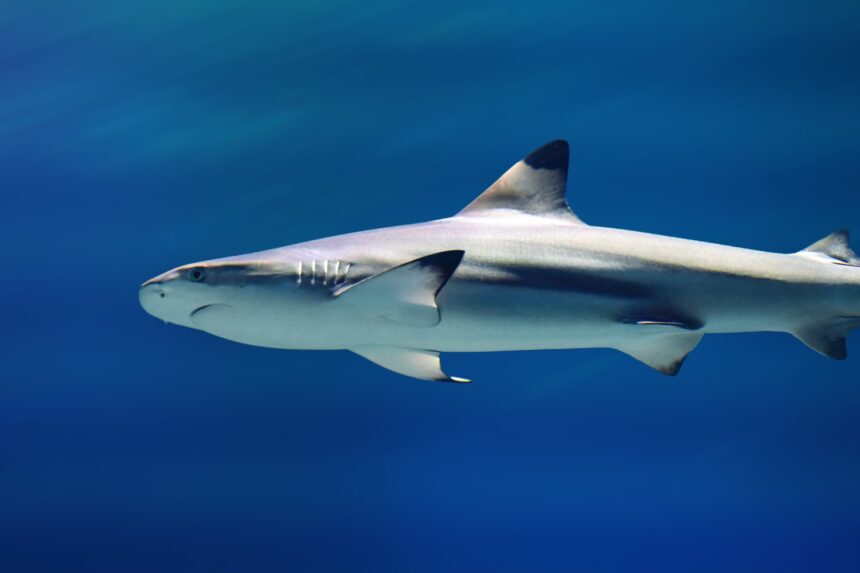Sharks might not be as responsible for rare human bites as we assumed. In a study released today, scientists argue that at least some shark bites should be considered a form of self-defense.
Marine biologists from France led the research, published in Frontiers in Conservation Science. After analyzing shark bite data from throughout the world, they estimated that about 5% of shark-on-human bites are wholly defensive, rather than sharks trying to catch their next meal. The findings should help inform shark bite prevention efforts, the researchers say.
Lead researcher Eric Clua, a shark specialist at PSL University, was inspired to look into the topic by observations he had made during his field studies in French Polynesia.
He often heard about fishermen who systematically slaughtered sharks that had unwittingly become trapped in fish pens. These sharks would sometimes bite the fishermen if they were initially unsuccessful in killing the animal. He also heard reports of accidental shark bites on underwater spearfishermen where the sharks appeared to only attack because they wanted the fisherman to stay away from their prey.
“On closer examination, the opportunity arose to model this self-defense mechanism described in the study, which insists on human and not shark responsibility in this type of accident,” Clua told Gizmodo in an email.
The researchers first analyzed data from recorded shark bites in French Polynesia—specifically, incidents that contained at least some information on the possible motivation behind the bites. Between 2009 and 2023, 74 such shark bites were documented in the area. Four of these bites, 5% of the total, were likely motivated by self-defense, the researchers found.
Clua and his team then scoured through data from the Global Shark Attack Files, which has documented nearly 7,000 shark bites since 1863. They examined bites classified as provoked, involving people placed in close proximity to sharks. Once again, about 5% of the bites they studied—322 bites overall—seemed to meet the criteria for self-defense.
These criteria include the sharks biting immediately after a human action that is, or could be perceived as, aggressive, and the bites being repeated but leaving superficial, non-lethal wounds. Paradoxically, a defensive shark bite might also be disproportionately violent compared to the human action that preceded it, such as a stranded shark aggressively biting a human trying to return it to the water. But this disproportionality might simply be a sign of the shark’s desperation to survive at any cost, according to Clua.
“The results of this study show that sharks have as much right as any animal or human to defend themselves when their survival is at stake,” he said. “They also show that, counter-intuitively, it is advisable not to come to the aid of a shark in danger, as it will not necessarily perceive this human action positively and may react aggressively.”
By uncovering the many motivations behind shark bites, the team hopes to prevent them from happening in the first place. People shouldn’t interact with or approach sharks, for instance, even if they seem harmless or appear to be in danger. And in general, you should be in groups of at least two people when swimming in places where sharks live, which can reduce the risk of a sustained predatory attack. Unlike some land predators, Clua adds, staying still will not dissuade a predatory shark from attacking, so you should always try to defend yourself if the worst-case scenario happens.
At the same time, the researchers note that sharks are typically afraid of humans. As a result, shark bites are very uncommon, and even more rarely are they fatal compared to other animal-human interactions.
There were only 88 shark bites recorded worldwide in 2024 and seven related deaths, for instance. By contrast, hippos are estimated to fatally attack at least 500 people a year, and the fatality numbers get even more skewed when you consider the diseases spread by certain animals (mosquito-borne malaria alone kills over a half million people each year). So while it’s important to practice good safety in waters that could contain sharks, people (reporters included) also shouldn’t over-inflate the risk of being bitten by them in the first place.
“In addition to reducing the number of such bites in the field, we hope that one of the major effects of our study will be to modify the vision and attitude of journalists, by suggesting that they take a closer look at the conditions in which bites occur, without systematically blaming the animals, but rather making humans more responsible,” Clua said.
The team plans to continue studying other types of shark bites, such as “exploration”-driven bites where the sharks might bite humans to test whether they’re suitable prey.
Read the full article here












